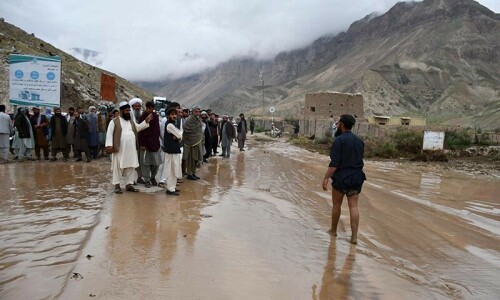LOS ANGELES: In his final televised speech to the Iraqi people in 2003, Saddam Hussein denounced the invading Americans as ‘the Mongols of this age’, a reference to the last time infidels had conquered his country, in 1258. But the comparison isn’t very apt — unlike the Mongols, the Americans don’t have the organisational genius of Genghis Khan.
In the 13th century, Temujin — better known by his title, Genghis Khan (“world leader”) — headed a tribal nation smaller than the workforce of Wal-Mart, yet he conquered and ruled more people than anyone in history. After Genghis Khan’s death, his grandson, Hulegu, further expanded the empire, easily conquering most of the Middle East and achieving the Mongols’ aim: the establishment of a trade corridor from Korea on the Pacific to Syria on the Mediterranean, one part of their goal of controlling the world.
So that every warrior knew his place within the struggle, Genghis Khan began each campaign with meetings to communicate to his approximately 100,000 soldiers where and why they would fight. The legal justification for the Mongol invasion of Iraq derived from the reluctance of the caliph of Baghdad to control the Cult of the Assassins, whom the Mongols accused of attempting to kill their khan.
The assassins operated from a series of fortified mountain camps spread from contemporary Afghanistan to Iraq, and the Baghdad invasion did not begin until the Mongols had eradicated the threat from the assassins and destroyed their fortresses. For the final attack on the caliph, the Mongols assembled a coalition of nations, and as their main army invaded Iraq in two columns from the east and the south, their allies approached from the north and west.
Genghis Khan recognised that victory came by conquering people, not land or cities. In contrast to the Americans in 2003, who sought to take the largest cities first in a campaign of shock and awe, the Mongols in 1258 took the smallest settlements first, gradually working toward the capital. Both the Mongols and the Americans used heavy bombardment to topple Baghdad, but whereas the Americans rushed into the capital in a triumphant victory celebration, the Mongols wisely decided not to enter the defeated — but still dangerous — city. They ordered the residents to evacuate, and then they sent in Christian and Muslim allies, who seethed with a variety of resentments against the caliph, to expunge any pockets of resistance and secure the capital. The Americans ended up as occupiers; the Mongols pulled strings, watching from camps in the countryside.
The Mongols also immediately executed the caliph and his sons on charges that they spent too much money on their palaces and not enough defending their nation. They killed most members of the court and administration. The Mongols took no prisoners and allowed no torture, but they executed swiftly and efficiently, including the soldiers of the defeated army who, they believed, would be a constant source of future problems if allowed to live. The first several months of a Mongol invasion were bloody, but once the takeover ended, the bloodshed ended.
By contrast, the American military campaign was quick, with comparatively few Iraqi (or coalition) casualties, but the bloodshed has continued for years. Constrained from decisively dispatching enemies of a new Iraq, the United States has allowed Iraqi terrorists to select who lives and who dies, including women and children, in a slow-motion massacre.
And while the violence continues, the US can’t come close to establishing a government that rivals what the Mongols achieved. They exercised a genius for speaking to people in terms that they understood. When conquering Muslims, Genghis Khan always announced that Allah willed the Mongol victory as divine punishment; to resist the Mongols was to defy the will of God.
Just as the Mongols perfected the list of who to kill in a conquered land, they knew whom to reward and how to do it. In Baghdad, Hulegu installed a government under Ata Malik Juvaini, a devout Persian Muslim, who governed for most of the next 20 years and whose writings survive as some of the great scholarly works of the Muslim world.
The Mongols spared anyone with a craft, such as carpentry, writing, pottery, weaving or metal working. They fiercely enforced religious freedom, which created an essentially secular state. In Baghdad, they gave many of the caliph’s palaces to Mongol allies for more practical uses. They lowered taxes for merchants and eliminated them for religious, medical and educational professionals. They educated women along with men. For all subjects, they instituted harsh laws enforced equally under nearly incorruptible officials.
Muslims look back at Mongol secularism as a scourge. But, although US rule in Iraq has produced a constant flow of refugees, particularly religious minorities, out of the country, under Mongol rule Christian, Muslim, Jewish and even Buddhist immigrants poured into the newly conquered Iraq to live under the Great Law of Genghis Khan. It was said that during this time a virgin could cross the length of the Mongol Empire with a pot of gold on her head and never be molested.
By the time of the US-led invasion of Iraq, the political achievements of the Mongols had been forgotten, and only the destructive fury of their wars was remembered. Yet under the Mongols — and the legacy of Genghis Khan — Iraq enjoyed a century of peace and a renaissance that brought the region to a level of prosperity and cultural sophistication higher than it enjoyed before or after. Any country with a bent for empire could do worse than learn from Genghis Khan. —Dawn/The Los Angeles Times News Service
Jack Weatherford teaches anthropology at Macalester College. He is the author of "Genghis Khan and the Making of the Modern World."













































Dear visitor, the comments section is undergoing an overhaul and will return soon.